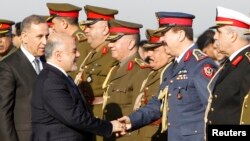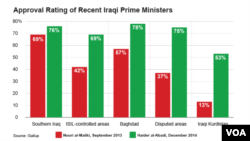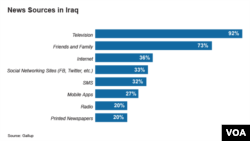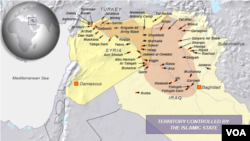New surveys of people across Iraq show growing economic worries, more support for the new prime minister than the previous leader, and continued sharp divisions along sectarian and ethnic lines.
The data come from telephone surveys with thousands of mobile and land-line phone users, including those in areas controlled by the insurgent group that calls itself the Islamic State.
The Gallup polling organization has been doing surveys in Iraq for 10 years, and a recent study that focused on media usage in the country was commissioned by the U.S. government agency that manages the Voice of America.
Politics
Some survey questions focused on the performance of two recent Iraqi prime ministers. In 2013, a majority of respondents in southern Iraq, a predominantly Shi’ite area, expressed confidence in former Prime Minister Nouri al-Maliki. But only 13 percent of Iraqi Kurds said he earned their confidence.
Survey data show the new prime minister, Haider al-Abadi, is a more popular figure. In December 2014 he earned the confidence of 53 percent of respondents in Iraqi Kurdistan and 76 percent of those in southern Iraq, an 69 percent of those in IS-controlled areas.
Economic worries
Gallup studies also show a rising number of Iraqis who describe the economic situation “poor.”
Economic concerns are not surprising in light of a new report from the International Monetary Fund that says Iraq's economy has been hit hard by the IS insurgency and the collapse of oil prices. Wednesday's IMF report says these problems caused Iraq's economy to shrink by two percent last year.
Gallup data show a majority of Iraqis find it difficult to live on their current income, and about half sometimes struggle to pay for food and shelter.
Worries about the economy rose most sharply in IS-held areas, but also grew in Iraqi Kurdistan, which has been fighting off attacks by IS.
Perceived well-being rose in Baghdad and southern Iraq, areas that have been less affected by recent conflict.
Economic and security worries mean Iraqis are likely to follow the news, and survey data show the nation's dominant medium is television.
Data also show Internet usage is growing rapidly. While 52 percent of Iraqis have never used the Internet, half have on-line access and 40 percent of Iraqis have used the Internet in the past week. Iraqi males, well-educated people, and Kurds are more likely than average to use the Internet.
The rising level of Internet use is interesting in light of the skill demonstrated by IS in using online social media to publicize their cause, spread their ideology, and recruit supporters.
Some IS recruiting efforts will certainly be aimed at Iraq's governorates Al-Anbar and Ninevah, according to Washington Institute for Near East Policy scholar James Jeffrey. The former ambassador says the Shi'ite-led central government has done too little to deliver services to these governorates, and that added to Sunni discontent in the area.
Survey data show male Iraqis of prime military age in this area are more likely to have been displaced, more likely to be struggling economically, less likely to be well-educated, and less likely to trust what they see on television than most Iraqis.
While these male Iraqis between 15 and 34 are also less likely than the average Iraqi to use the Internet, the 28 percent who do use the net are more likely to trust the news they find there.
Officials may worry that this combination of marginalization and Internet use could make this group receptive to IS recruitment.








